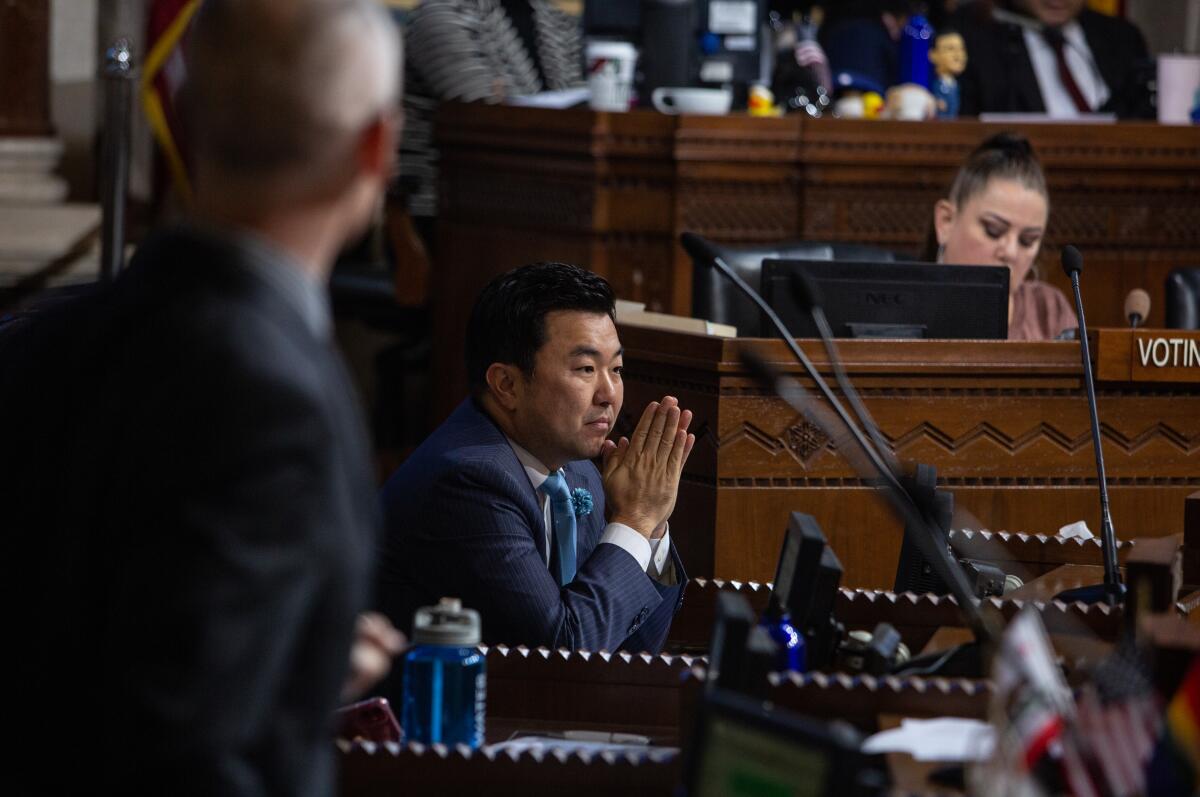L.A. limits campaign donations from real estate developers. Critics say it falls short

- Share via
The Los Angeles City Council unanimously approved a law Wednesday that will crack down on campaign contributions from real estate developers, despite warnings from critics who said it had been too watered down to curb the power of political spending.
The idea, first proposed by council members nearly three years ago, had languished until an FBI raid at City Hall cast a fresh spotlight on long-standing concerns about developer donations and political power.
Despite the unanimous vote, some on the council made clear they were not enthusiastic about the proposal, with Councilman Mike Bonin saying the city needs to stop approving “piecemeal crap.”
Councilman David Ryu, who pushed for the new restrictions, acknowledged that the new ordinance is “not perfect” and does not go as far as he and many reformers had hoped. But he heralded it as a first step toward restoring trust in City Hall, one that would start to combat the perception that developer money drives their decisions about what gets built in Los Angeles.
“Doing nothing will cost us the trust of Angelenos,” Ryu told the council ahead of the vote. “And it is the public’s trust that is the foundation of everything that we do.”
Under the new ordinance, real estate developers will be barred from giving political contributions to Los Angeles city officials and candidates for council, mayor or city attorney while the city weighs key approvals for their building projects, including zone changes and allowing added height.
Developers will face such restrictions for a year after a final decision on each application.
Critics complained that the ban was full of loopholes, allowing developers to continue currying favor with politicians at City Hall.
A coalition of groups that pushed for tighter restrictions, including the California Clean Money Campaign and California Common Cause, argued that passing the ordinance would be “worse than not passing anything at all,” fueling even deeper distrust of the city.
The law does not prohibit developers from hosting fundraisers or raising money from other donors. It does not penalize politicians for knowingly receiving those banned donations. And critics lamented that it does not apply to major subcontractors on a development project.
The law is “a skeleton of what was originally proposed,” said Wayne Williams, a board member with the California Clean Money Campaign, calling it “quite disappointing.”
The law will not go into effect for more than two years — a delay that officials said was needed to first set up a database tracking who is prohibited from donating. Activists had argued that such a delay would allow incumbents to continue collecting developer money as they seek reelection, giving them an advantage over any challengers.
For much of Wednesday’s debate, council members pounded on Ryu and his proposal, saying he had taken the wrong approach on campaign finance reform.
Bonin, who co-sponsored Ryu’s proposed ban in January, questioned why the city would ban donations from affordable housing developers and not fossil fuel executives. He argued the city should instead focus on full taxpayer financing of city campaigns.
“I actually don’t think this is a particularly groundbreaking or a particularly important or significant piece of legislation today,” Bonin said. Bonin’s proposal for full public financing expired this year.
When Ryu sought to speed up the implementation of the law, making it effective for the entire 2022 election campaign, no one else on the council backed the idea. Instead, Bonin chided Ryu, calling him “disingenuous” for not seeking to have the rules apply during the March municipal election, when Ryu will be on the ballot.
Councilman Mitch O’Farrell piled on, arguing that Ryu’s measure didn’t go far enough because the developer donation limits don’t take effect immediately.
Neither O’Farrell nor his colleagues attempted to change that during Wednesday’s meeting.
Ryu swore off developer donations when he first ran for office and has again pledged not to take them in his current campaign. His rivals argue he has broken that promise.
The council has not moved forward with two other proposals backed by the Ethics Commission: new restrictions on “behested payments” — donations solicited by politicians for their favored charities — and a ban on donations from corporations and other “non-individuals.”
Wednesday’s vote marked the culmination of years of debate. Ryu initially struggled to get traction for similar proposals at City Hall.
Some council members backed the idea in 2017 as they tried to defeat a ballot measure that would have blocked approval of some large developments. Ryu’s plan languished, however, after voters rejected that ballot measure.
Council members revived the proposal after FBI agents raided the home and offices of Councilman Jose Huizar in November 2018. The councilman, who has not been publicly charged with a crime, had been heading a powerful committee that oversees development decisions.
Real estate developer Tom Gilmore, who has redeveloped office buildings into housing in downtown Los Angeles, called the new ordinance “a nice PR stunt at best.” As long as the law doesn’t bar developers from raising money for city candidates, he said, it is “all form and no substance.”
“I don’t think it’s meaningful to block developers from giving $800 checks [to candidates] while still allowing them to raise $20,000,” he said.
L.A. already restricts campaign contributions from registered lobbyists and bidders for city contracts. When the city turned its focus to developer donations, the Ethics Commission recommended that the new restrictions cover a larger pool of donors than the proposal submitted by Ryu — including major subcontractors, consultants and anyone on a developer’s “project team.”
“Just look at some of our past corruption scandals and the way developers utilize everybody in their orbit — contractors, subcontractors, down to groundskeepers and housekeepers like we saw in the Sea Breeze scandal,” said Rob Quan, an organizer with the group Unrig L.A., referring to a Times investigation into donations linked to a developer.
The new law would prohibit donations from donors listed as the property owner or company that files an application for a development project. It also applies to those companies’ top executives, board chairs and people who own a significant stake, among others.
Some critics contend the new rules will spur developers to pour more money into “independent expenditure committees,” which have no limits on how much they can receive and cannot coordinate with their chosen candidates. The city cannot legally restrict such donations.
“Do I think this is going to solve all corruption? Of course not,” Ryu said, adding that he plans to pursue more reforms. “But this is something that has been needed in the city of Los Angeles for decades.”
More to Read
Sign up for Essential California
The most important California stories and recommendations in your inbox every morning.
You may occasionally receive promotional content from the Los Angeles Times.












